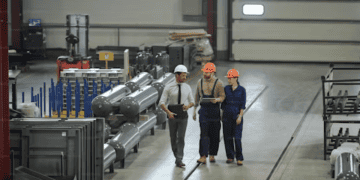India’s economic growth faces a challenge as nearly half of its workforce is still engaged in agriculture, despite the sector contributing only 18% to the country’s GDP. Analysts suggest that manufacturing could play a key role in shifting the labor force to more productive sectors, but the lack of adequate worker housing is hindering progress.
Manufacturing offers a potential solution, capable of employing unskilled labor at a scale needed to drive economic development. Positions in manufacturing and services generate outcomes 3-6 times more productive than agricultural labor, making the sector a strong candidate for absorbing workers and stimulating economic growth. However, industrial clusters, which are central to manufacturing expansion, struggle with workforce shortages due to insufficient housing options in nearby towns and villages.
One of the primary obstacles is the scarcity of proper worker housing near industrial hubs. The lack of adequate accommodation leads to labor shortages and reduces overall productivity, which in turn limits India’s ability to compete in global manufacturing markets. Current housing solutions are often informal and inadequate, consisting of unauthorized settlements that do not meet the required capacity or quality standards.
This inadequate living situation deters workers from migrating closer to industrial areas, exacerbating the labor supply issue. Furthermore, private sector efforts to address the housing gap are hindered by regulatory challenges, including strict zoning laws, complicated building regulations, and high operational costs such as GST and commercial property rates.
To address these challenges, a recent report recommends several reforms to support the growth of India’s manufacturing sector. Key proposals include introducing mixed-use zoning laws to facilitate worker housing, simplifying building codes to reduce costs and delays, and exempting worker housing from GST and commercial property fees.
Additionally, the report suggests classifying worker housing as essential infrastructure, which would allow for government support such as construction subsidies and rental vouchers for workers. These reforms aim to improve housing affordability, encourage worker migration to industrial hubs, and ultimately promote industrial growth.
With these changes, experts believe that India can harness its manufacturing potential, providing a pathway for increased productivity and economic expansion.
Get the newest supply chain report news updates at The Supply Chain Report. Interested in international trade? Check out ADAMftd.com for free tools.
#ManufacturingGrowth #WorkerHousing #SupplyChainNews #IndustrialDevelopment #EconomicGrowth















